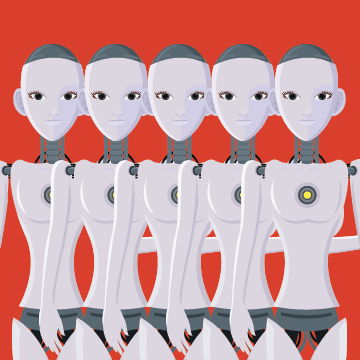Artificial intelligence has recently taken the world by storm. With the rapid development of innovative technology in recent years AI has been on the come up. There are many debates surrounding the development of AI such as the safety of the concept. Many people fear that AI could have the potential to erase the natural balance of the world and take out the human race. The late prominent physicist Stephen Hawking even believed there should be limits to AI.
“The primitive forms of artificial intelligence we already have, have proven very useful. But I think the development of full artificial intelligence could spell the end of the human race,” Hawking said in an interview with the BBC.
With the ongoing debate on whether AI poses a threat to the human race another debate surrounding AI tends to get overshadowed. Many scientists of color within AI fields have been attempting to get the public’s attention on the discrimination in AI technologies. The argument is that current AI technologies have been designed primarily by white people and this leads to discrimination against darker skinned people.
“…there are barely any black people in AI. AI is a field that tries to teach machines to be intelligent, we teach machines to understand the world given the data that is around them: advertisements, TV shows, movies, news articles, YouTube comments and these are very bias because we live in a bias society,” Timnit Gebru, an AI researcher at Microsoft, said.
There seems to be a lack of interest in STEM fields from minority students at an early age.
“…in the past I have noticed a lack of interest in STEM and literature from minority students. Also, take into account self-fulfilling prophecy (being told from an early age they are ‘less than’…is a huge factory in why we need early literacy intervention starting at preK-2nd grade,” Valez-Powell, an education major at Winthrop, said.
Gebru explains that people of color are not given opportunities to pursue AI careers. According to US News African–Americans and Latino workers only make up 16 percent of advanced manufacturing jobs, 15 percent of computing workforce and 12 percent of engineering workforce. This is compared to whites and Asians making up 83 percent of advanced manufacturing workforce, 84 percent of the computing workforce and 87 percent of engineering jobs. Since lighter skinned people are mostly the ones designing AI technologies it is argued that AI technology tends to favor lighter skin over darker skin.
“AI is being used in little things everywhere and it’s not what we think of in the movies with the terminator robots being racist killing black people. That’s not how this whole thing is going to work…basically racism is being propagated in ways were not even thinking about in our daily lives,” Gebru said.
Gerbu explains that different AI technologies are less likely to work as well on darker skin. For example, AI is able to detect skin cancer but will have more trouble finding melanoma on darker skin. Overall, optic sensors have a much harder time reading darker skin. This also works with things such as automatic soap dispensers and faucets.
There are also more serious issues with racism in AI that affects more than just having trouble getting soap out of a dispenser.
“There is a software that is being used to decide your likelihood of committing a crime. This software is used by judges to help decide how many years you should go to prison for,” Gerbu said
This software is called Compass. According to an article in Newsweek this “risk assessment algorithm” suggests a judge’s decision about bail, jail time, and release time for an accused person. The algorithm makes this decision based on the questions of will this person show up for court? Or would this person be arrested again?
“Black people who are sentenced to this risk assessment algorithm [compass] versus white people, show incredible and immense disparities and if you look at some of the questions according to those risk assessments I should be sitting in jail right now. Do you know anyone that’s been incarcerated? Absolutely. The questions are bias,” Yeshimabeit Milner, the executive director/co-founder of Data for Black Lives said.
According to experts there are many issues with AI that desperately need to be solved. The main consensus is that diversity in STEM fields, specifically technological fields, is the answer.




